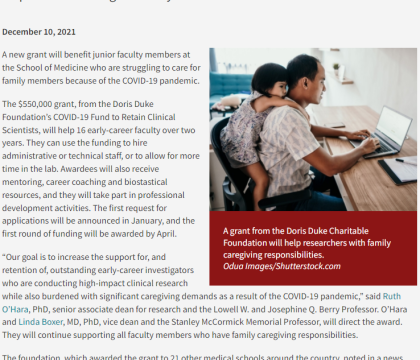COVID-19 Fund to Retain Early-Career Scientists Program (Second call)
The Stanford Medicine COVID-19 Fund to Retain Early-Career Scientists requests applications for supplemental research funding to support early career faculty whose research productivity has been impacted by COVID-related caregiving responsibilities.
With funding from the Doris Duke Charitable Foundation, the Rita Allen Foundation, and Stanford School of Medicine, the overall aim of this program is to provide “extra hands” support for early career faculty whose research career trajectory has been disproportionally impacted by COVID-related caregiving burden. Building upon our extant programs at Stanford, all awardees will also be supported by tailored mentoring, career coaching, professional development, grant development, networking resources, and biostatistical support. The long-term goal is to increase the support for, and retention of, outstanding early career faculty who are conducting high-impact research while also burdened with significant caregiving demands as a result of the COVID-19 pandemic. The Co-Directors of the Program are Dr. Ruth O’Hara, Senior Associate Dean for Research in the School of Medicine, and Dr. Linda Boxer, Vice-Dean of the School of Medicine.
- School of Medicine assistant professors and new associate professors (within their first year of appointment) with UTL, UML, NTLR, or CE appointments. CE PI Waivers are not required for this program.
- Funding from the Doris Duke Charitable Foundation and Rita Allen Foundation will support physician scientists who devote at least 50% of their effort to clinical research, while funding from Stanford School of Medicine will support early-career faculty engaged in research across the basic, translational, and clinical research spectrum.
- Compelling need for “extra hands” supplements that would boost productivity in light of increased pandemic-related caregiving. Caregiving is defined broadly as childcare, partner care, eldercare, caring for those with COVID-19 and/or other compelling instances of caregiving responsibilities.
- Must have an extant intra or extramural career development award or research project grant with annual direct costs sufficient to provide both research and salary support.
- The Grant cannot be used to support experiments that utilize non-human animals, or any tissues derived from them.
- No part of the Grant may be used to support any research involving human subjects that does not have the IRB approval or determination.
- All clinical trials supported in part or in full by the Grant must be registered in a public registry of clinical trials, such as www.clinicaltrials.gov.
Definition of Clinical Research:
For this Program, clinical research is defined as the scientific investigation of the etiology, prevention, diagnosis, or treatment of human disease using human subjects, human populations or materials of human origin. Included in the definition are studies that utilize tissues or pathogens only if they can be linked to a patient.
- Research Description (3 pages max)
- Description of Need (1 page max)
- Detailed Budget and Budget Justification
- Current and Pending Support Report from SeRA
- NIH Biosketch
- Letter of support from Department Chair or Institute Director (2 pages max)
- Please include a paragraph describing your approach to promoting diverse, inclusive and equitable research. This paragraph could include such approaches as they apply to your mentorship, your trainee cohort, patient/participant recruitment (for Human Subjects Research), community-engagement activities, any trainings or didactics that you or your lab members have attended that are relevant in this regard, etc.
- We expect to award 8 to 10 research supplements in FY2023.
- Research supplements will be between $35,000-$50,000 depending on need and will have a duration of one year.
- Funding must be used to support “extra hands” (Admin Support, Research Associate/Technician, Clinical Research Coordinator, etc.) effort, grant writing support, or buy out of required clinical time so that more time can be spent on research. Because recipients are expected to have a main research grant, research costs, such as supplies, travel, sequencing, core facility costs, are not allowable costs. The Supplemental funds may not be used for childcare or other family caregiving costs directly.
